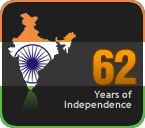 The workshhop - Transforming Ideas into Action: The Building of a Healthy and a Prosperous India - was held at the India Islamic Cultural Centre, New Delhi on December 12, 2009, as the second phase of the nation-wide campaign Mera India, Bridge the Gap.
The workshhop - Transforming Ideas into Action: The Building of a Healthy and a Prosperous India - was held at the India Islamic Cultural Centre, New Delhi on December 12, 2009, as the second phase of the nation-wide campaign Mera India, Bridge the Gap.
The first part of the campaign had focussed on getting young Indians to come up with ideas on how to achieve the Millennium Development Goals and to get them to rate which constituents could play more of a role making the goals possible in the Indian context. ‘The Youth’ by far was voted as the most important constituent in achieving the MDGs. Consequently the youth-centric workshop sought to involve the youth in the nation-building process through demonstration of practical solutions.
 Students active in National Social Service NSS, Social Service Leagues and socially active youth from St. Stephen’s College, Kamla Nehru College, Jesus and Mary College, Netaji Subhash Institute of Technology, Kirori Mal College, Dayal Singh College, Jawaharlal Nehru University and the Jamia Millia Islamia attended the workshop. Journalism students from the Times Centre for Media Studies and the Indian Institute of Mass Communications also participated.
Students active in National Social Service NSS, Social Service Leagues and socially active youth from St. Stephen’s College, Kamla Nehru College, Jesus and Mary College, Netaji Subhash Institute of Technology, Kirori Mal College, Dayal Singh College, Jawaharlal Nehru University and the Jamia Millia Islamia attended the workshop. Journalism students from the Times Centre for Media Studies and the Indian Institute of Mass Communications also participated. In the opening address, Pamela Philipose, Director, Women's Feature Service, gave an overview of India’s performance on MDGs and emphasized the existing gaps. This was followed by an introduction on the campaign and workshop by Shree Venkatram, Director, Unnati Features. The contest and the campaign was hosted by the two media organisations.
In the opening address, Pamela Philipose, Director, Women's Feature Service, gave an overview of India’s performance on MDGs and emphasized the existing gaps. This was followed by an introduction on the campaign and workshop by Shree Venkatram, Director, Unnati Features. The contest and the campaign was hosted by the two media organisations.In the first session, Engaging with your local elected representative, Dr M R Madhavan and Tonusree Basu from PRS Legislative Research, discussed how citizens can engage in the formulation of laws and the specific stages when they can play a role. The duties of a Councillor, an MLA and an MP were also discussed.
 Following this, two young men, Raghav Pal and Varun Kapoor shared how they had formed a Youth Welfare Association in Lajpat Nagar and their experience of engaging local youth and elected representatives in improving the living conditions in the area.
Following this, two young men, Raghav Pal and Varun Kapoor shared how they had formed a Youth Welfare Association in Lajpat Nagar and their experience of engaging local youth and elected representatives in improving the living conditions in the area.
In the second session, Manish Sisodia from KABIR presented some encouraging case studies citing the Right to Information Act as a powerful tool in the hands of citizens for keeping the government machinery in check. He gave instances of how common people had used the tool to get ration cards, have an areas cleaned up of garbage, and for disbursing school uniforms in a rural area. Participants were keen to know how and where RTI applications can be filed and there was discussion on how the system could be further improved. Pooja Parvathi from the Centre for Budget and Governance Accountability gave a presentation on how citizens can track public expenditure with examples from the Sarva Siksha Abhiyan and the Mid-day Meal Scheme.
Pooja Parvathi from the Centre for Budget and Governance Accountability gave a presentation on how citizens can track public expenditure with examples from the Sarva Siksha Abhiyan and the Mid-day Meal Scheme.
In the concluding session, giving their feedback, the participants said the workshop would propel them into action.











No comments:
Post a Comment